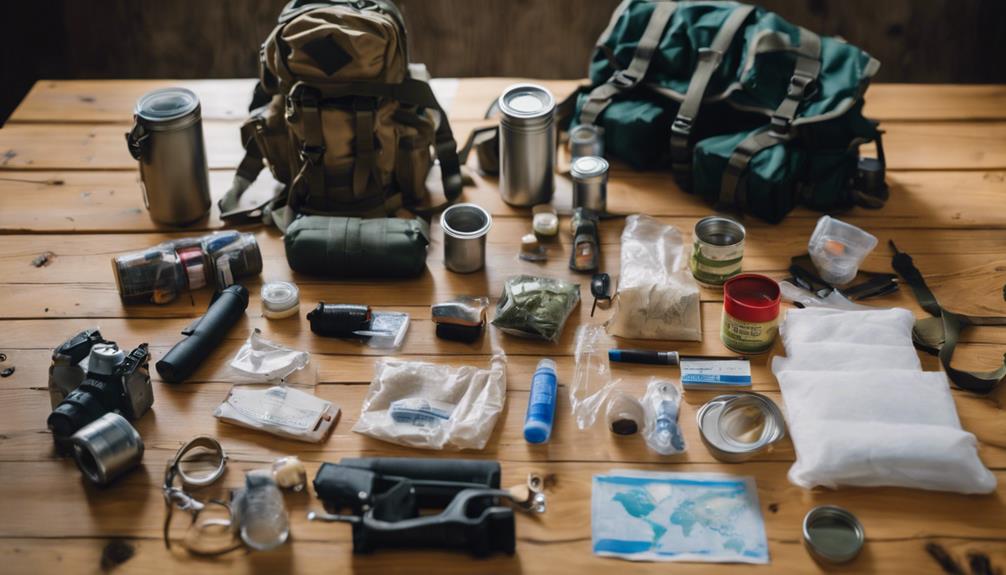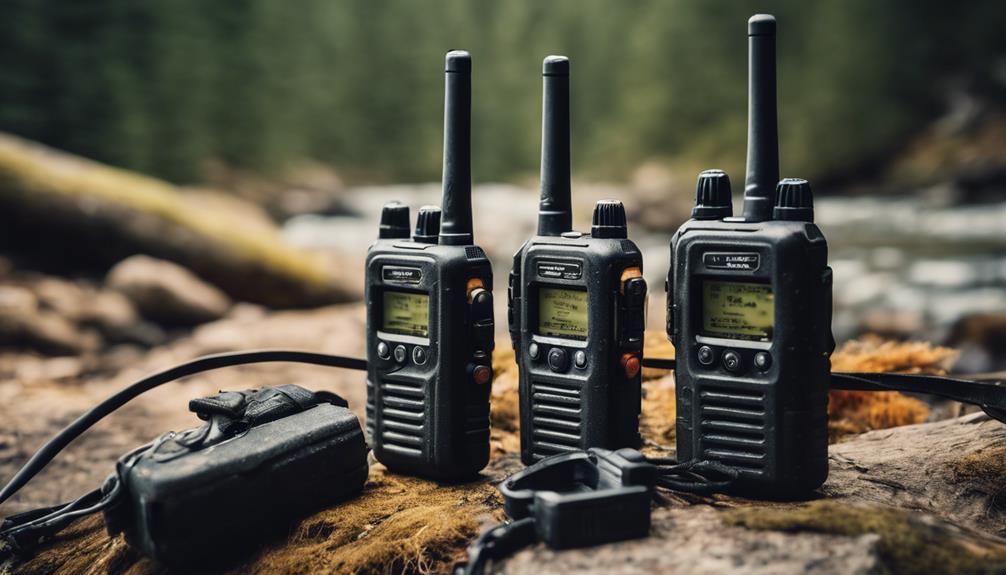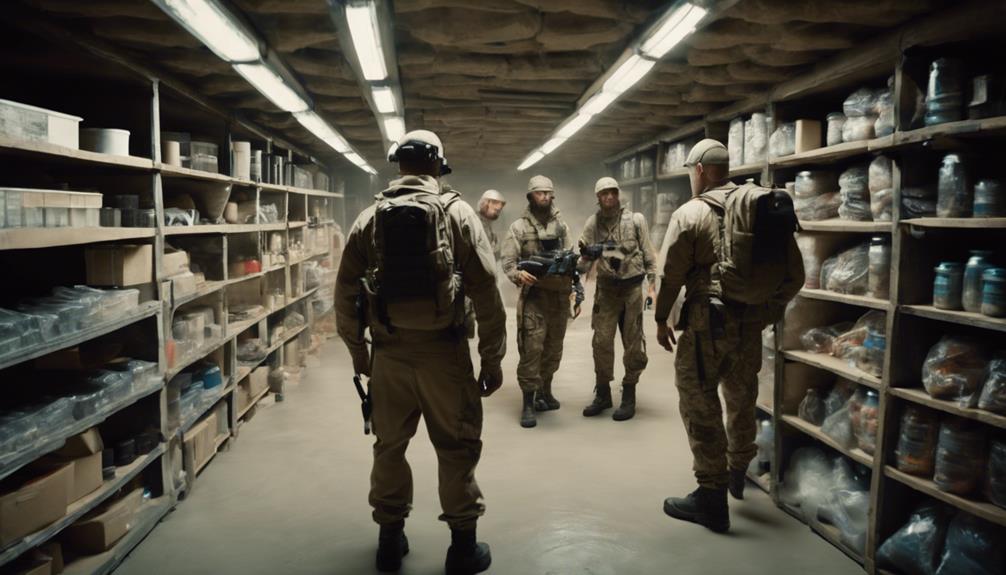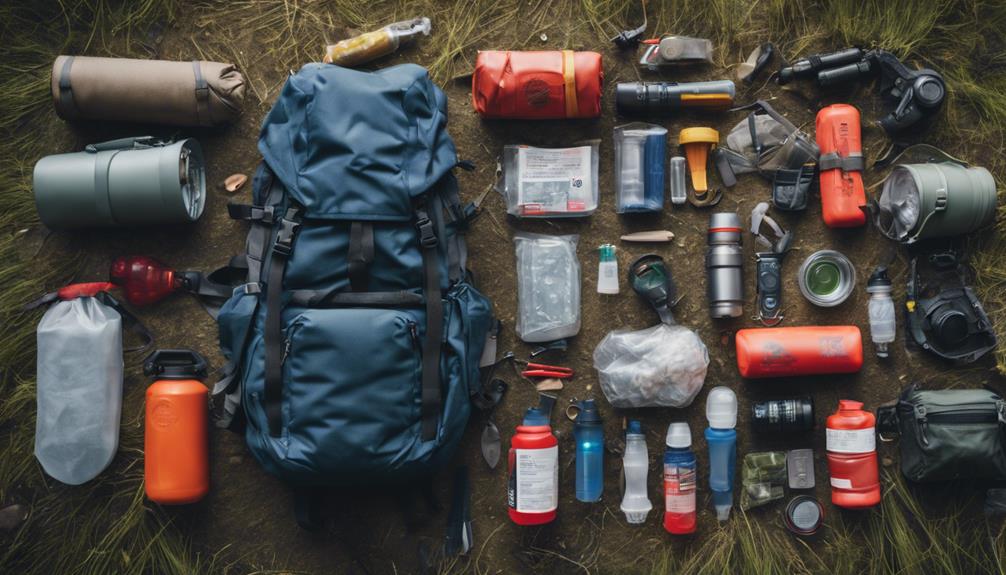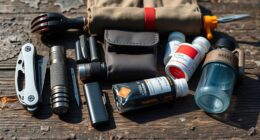To excel in prepping, grasp potential threats, prepare important categories like food and self-defense, assembled a bug-out bag with essentials, secure your home effectively, and ready for power outages. Make sure you stock emergency supplies, store them properly, and develop self-reliant skills like food production and basic survival techniques for thorough preparedness. Discover the significance of recognizing edible plants, raising livestock, and mastering practical skills to thrive in crisis situations. Useful tips like starting a fire sans matches, building shelters, and purifying water are fundamental. Understanding these aspects lays a solid foundation for your survival preparedness journey.
Key Takeaways
- Master essential prepping categories like food storage, water purification, and self-defense.
- Build a comprehensive bug out bag with necessities for 72-hour emergency preparedness.
- Secure your home with reinforced doors, alarms, and a well-thought-out defense plan.
- Prepare for power outages with essential kits, surge protectors, and backup power sources.
- Develop self-reliant skills like food production, livestock rearing, and practical survival techniques.
Understanding Potential Threats
Identify potential threats that could impact your survival, including natural disasters, societal unrest, economic collapse, and pandemics.
When creating your survival guide, consider the various ways natural disasters like hurricanes and earthquakes can disrupt your daily life. Power outages, a common consequence of these events, can leave you without essential resources.
To prepare for such scenarios, make sure you have a supply of non-perishable food, water, and emergency supplies that can sustain you during extended periods without electricity.
In addition to natural disasters, societal unrest and economic collapse are potential threats that may require you to adapt quickly. Stay informed about current events and global trends to anticipate any signs of instability.
Being aware of historical emergencies in your area can help tailor your preparedness plans effectively. Consider how supply chain disruptions during times of crisis can impact your access to necessities.
Essential Prepping Categories

To effectively prepare for survival situations, you must understand the key categories of prepping, such as food storage, water purification, family protection, and self-defense skills.
Food storage is essential for sustaining yourself and your loved ones during emergencies, while water purification guarantees a safe drinking supply.
Family protection involves creating plans to secure your loved ones and assets, and self-defense skills are crucial for safeguarding against potential threats.
Additionally, having knowledge of first aid is important for addressing injuries in crisis situations, and understanding your supply chain helps in ensuring you have access to necessary resources.
Preppers focus on mastering these categories to be ready for natural disasters, economic collapse scenarios, and social unrest.
It also involves learning DIY weapon crafting, hunting, fishing, identifying edible plants, food preservation methods, and cooking without stoves.
The Preppers Guide to Survival emphasizes the importance of readiness and resilience in uncertain circumstances.
Building Your Bug Out Bag

When assembling your bug out bag, prioritize essential items for 72-hour emergency preparedness. In times of crisis, you need to be prepared, and having a well-equipped bag can make a significant difference.
Include necessities like food, water, a first aid kit, flashlight, multi-tool, and personal documents. You never know when disaster might strike, so it's vital to have these items readily available.
Customize your bug out bag based on your specific needs, location, and climate. Make sure that it's lightweight, compact, and easy to carry in case you need to evacuate quickly.
Regularly check and update your bag to confirm all supplies are current and functional. Being proactive in maintaining your bug out bag can save valuable time and effort during an emergency situation.
Securing Your Home

Ensure the safety of your home by implementing effective security measures to protect your property and loved ones. Begin by reinforcing doors and windows with heavy-duty locks and security bars. Installing a home security system equipped with cameras, alarms, and motion sensors can act as a deterrent to potential intruders. For added protection, consider fortifying your home with reinforced doors, shatterproof windows, and even a designated safe room for emergencies.
Utilize landscaping strategically by planting thorny bushes, setting up outdoor lighting, and ensuring clear sightlines to minimize hiding spots for intruders.
It's essential to have a well-thought-out plan in place for defending your home in case of a break-in or intrusion. This plan should include safe areas where family members can retreat to and stay secure during emergencies.
Power Outage Preparedness

Prepare for power outages by assembling a kit with essential items like flashlights, batteries, and non-perishable food.
In addition to these supplies, consider using surge protectors to safeguard your appliances during power surges.
Planning for extended power outages is vital; having backup power sources like generators or solar panels can help you stay prepared.
Keep important documents such as insurance policies and identification in a waterproof container to protect them in case of power loss.
Be ready to shield electronic devices and appliances from damage during power outages as well.
Stocking Emergency Supplies

When preparing for emergencies, it's important to stock up on essential food items, water purification methods, and first aid supplies. These items can help you stay nourished, hydrated, and prepared to handle medical emergencies in challenging situations.
Make sure to include these basics in your emergency kit to guarantee you're ready for any unexpected events.
Essential Food Items
Stock up on non-perishable food items such as canned goods, rice, pasta, and dried fruits for long-term storage to guarantee you have essential sustenance during emergencies. Additionally, include high-protein items like canned meats, beans, and nuts for sustained energy. Don't overlook essential cooking supplies such as cooking oil, spices, and a portable stove for meal preparation. Remember to take into account any dietary restrictions or allergies when selecting emergency food items to make sure everyone's needs are met. It is important to rotate your emergency food supply periodically to maintain freshness and prevent spoilage.
| Food Item | Purpose |
|---|---|
| Canned Goods | Long shelf life for extended emergencies |
| Rice | Staple for energy and versatile meal options |
| Pasta | Filling and easy to prepare |
| Dried Fruits | Nutritious snack and natural sweetness |
| Canned Meats | High-protein source for sustained energy |
| Beans and Nuts | Protein-packed for long-lasting sustenance |
Water Purification Methods
Make sure your emergency supplies include essential water purification methods to safeguard your access to clean drinking water during crises.
Boiling water is a highly effective method, killing most pathogens when brought to a rolling boil for at least one minute.
Another option is using chlorine bleach, adding 8 drops (about 1/8 teaspoon) per gallon of water, stirring, and letting it sit for 30 minutes to disinfect it.
Iodine tablets or liquid can also purify water, with specific instructions based on the product used.
Water filters, such as ceramic or activated carbon filters, are effective at removing bacteria, protozoa, and other contaminants from water sources.
Additionally, solar stills can be utilized to purify water by collecting water vapor from contaminated sources through condensation, providing a safe drinking water supply.
Having a variety of water purification methods in your emergency kit ensures you can adapt to different situations and have access to clean water when needed.
First Aid Supplies
Guarantee your emergency readiness by stocking up on essential first aid supplies for treating minor injuries and common ailments. Remember, preparation is key to handling unexpected situations effectively. Here are four items to include in your first aid kit:
- Bandages, Antiseptic Wipes, and Gauze Pads: These are essential for cleaning and dressing minor wounds to prevent infections.
- Adhesive Tape, Scissors, and Tweezers: These versatile tools help secure bandages, cut gauze to size, and remove splinters or debris.
- Over-the-Counter Medications: Include pain relievers, antihistamines for allergies, and anti-diarrheal drugs to address common health issues quickly.
- Basic First Aid Manual: This guide can assist you in providing proper care for various medical emergencies.
Regularly check and replenish your first aid supplies to make sure they're current and ready for use in emergencies. Being well-prepared can make a significant difference in handling unexpected health concerns effectively.
Proper Storage Techniques

To guarantee the longevity and quality of your stored supplies, utilize proper storage techniques such as using airtight containers and storing items in a cool, dark place.
Airtight containers help prevent moisture and pests from damaging stored food, maintaining its freshness. Storing items in a cool, dark place can extend their shelf life by shielding them from heat and light, which can cause spoilage.
Vacuum sealing food items is another effective method to increase their longevity by removing air and reducing the risk of spoilage. Remember to rotate your stored supplies regularly, using older items first to prevent waste and ensure freshness.
Labeling stored items with expiration dates and contents is essential for easy tracking and managing of your inventory, facilitating efficient use. By following these proper storage techniques, you can make sure that your supplies remain in good condition and ready for use in times of need.
Developing Self-Reliant Skills

To endure uncertain times, it's vital to develop essential self-reliant skills. Learning how to forage for food, purify water, and administer basic first aid can be life-saving in emergencies.
Essential Self-Reliance Skills
Develop practical skills in growing food, raising livestock, and foraging for wild edibles to achieve self-sufficiency in food production.
Here are four key self-reliant skills to focus on:
- Food Production: Learn how to cultivate a variety of fruits, vegetables, and herbs in your garden. Understand the basics of composting, irrigation, and pest control to guarantee a successful harvest.
- Livestock Rearing: Explore the responsibilities of raising animals like chickens, goats, or rabbits for meat, eggs, and dairy products. Master animal husbandry practices, including feeding, housing, and breeding.
- Wild Edibles Foraging: Identify local edible plants and mushrooms in your surroundings. Acquire knowledge on safe foraging practices, distinguishing between edible and toxic species.
- Home Maintenance: Develop skills in basic carpentry, plumbing, and electrical work to handle repairs and upkeep around your property. Being self-sufficient in maintaining your shelter can be vital during times of crisis.
Practical Survival Techniques
Mastering practical survival techniques is essential for developing self-reliant skills in emergency situations. Knowing how to start a fire without matches using flint and steel or a bow drill is important for warmth, cooking, and signaling for help.
Foraging for edible plants and wild game can sustain you in the wilderness when food supplies are scarce. Building shelters from branches, leaves, and tarps provides protection from harsh weather conditions.
Understanding how to purify water through boiling, chemical treatment, or filtration methods guarantees safe drinking water. Administering basic first aid is essential for treating injuries and illnesses when professional medical help is unavailable.
By acquiring these skills, you enhance your ability to survive and thrive in challenging environments. Remember, practice and preparation are key to mastering these techniques effectively.
Stay informed, stay proactive, and stay safe in any survival scenario.
Frequently Asked Questions
What Is the First Rule of Prepping?
Prioritize your basic needs like food, water, shelter, and security. Establish a plan for different disaster scenarios. Build skills and knowledge to handle emergencies effectively. Stay informed about potential threats. Collaborate with like-minded individuals to enhance preparedness efforts.
What Do I Need to Be a Prepper?
To be a prepper, you need essential survival skills like food storage, water purification, and self-defense. Make a well-thought-out emergency plan tailored to potential disasters in your area. Stock up on supplies for readiness. Additionally, it’s crucial to stay informed about local hazards and how to prepare for disasters that are specific to your region, such as hurricanes, earthquakes, or wildfires. Regularly review and update your emergency plan to account for changing conditions, and consider practicing emergency drills with your family to ensure everyone knows their role. Remember, preparation is an ongoing process that requires vigilance and adaptation.
What Are 10 Items in a Survival Kit?
You need a reliable knife, water purification method, emergency shelter, fire starter tool, and high-calorie non-perishable food items in your survival kit. These essentials are vital for cutting, purifying water, shelter, creating fire, and sustaining energy levels.
What Is a Reasonable Amount of Prepping?
To prep reasonably, have a 72-hour emergency kit with food, water, and first aid. Plan for longer-term supplies. Establish a communication plan and know evacuation routes. Learn survival skills like fire starting and water purification. Adapt plans to local risks.
Conclusion
To sum up, being prepared for emergencies is like having a safety net in a tightrope walk – essential for peace of mind.
By understanding potential threats, organizing essential prepping categories, and developing self-reliant skills, you can navigate any crisis confidently.
Remember to build your bug out bag, secure your home, and stock emergency supplies for any situation.
Stay informed, stay prepared, and stay safe.
It's better to have it and not need it, than to need it and not have it.

